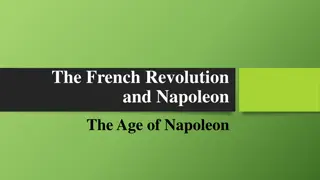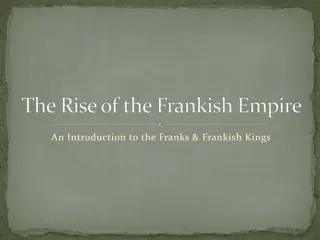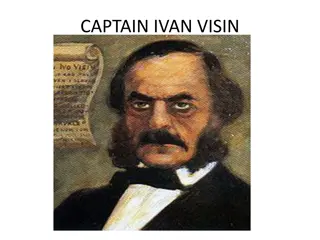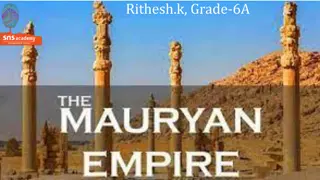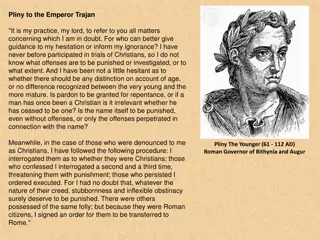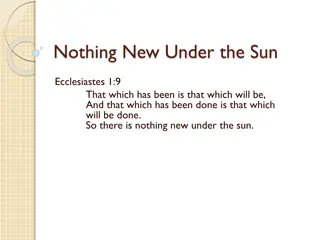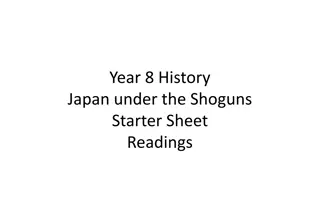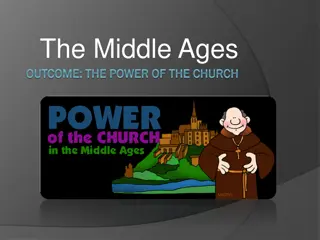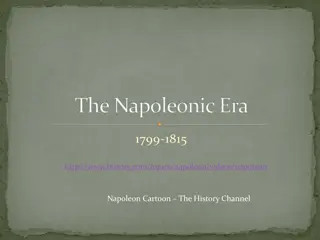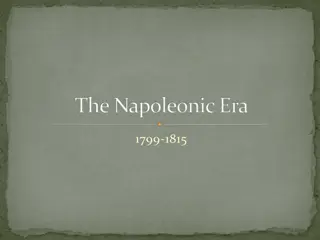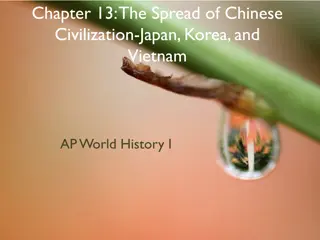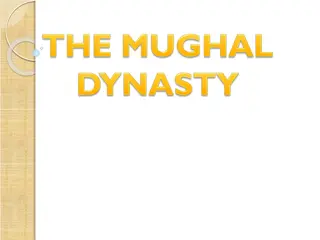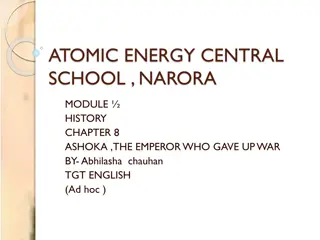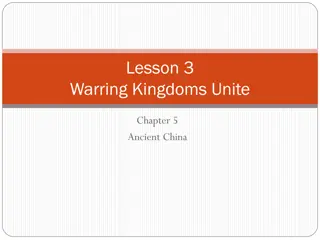Rise of Napoleon: From Revolution to Empire
Napoleon's rapid ascent to power, from his early military career during the French Revolution to crowning himself Emperor in 1804, marked by strategic victories, political maneuvers, and absolute rule that garnered both admiration and criticism.
1 views • 34 slides
Empagliflozin Effects on Heart Failure with Reduced Ejection Fraction: EMPEROR-Reduced Trial Overview
Empagliflozin's impact on cardiovascular and renal events in heart failure with reduced ejection fraction was assessed in the EMPEROR-Reduced trial led by Milton Packer, MD, and Faiez Zannad, MD. The trial, enriched for patients with severe left ventricular dysfunction, randomized participants to em
1 views • 22 slides
Rajput and Religious Policy of Mughal Emperors: Akbar vs. Aurangzeb
Akbar, the first Mughal emperor, pursued a diplomatic policy towards the Rajputs, aiming to bring them under his suzerainty while maintaining friendly relations. His successor, Aurangzeb, adopted a more aggressive approach, seeking to annex Rajput kingdoms due to religious differences. This shift in
0 views • 6 slides
The Rise of the Frankish Empire: A Journey Through History
Explore the fascinating history of the Frankish Empire from the conquest of Gaul by the Franks in the 5th century to the reign of Charlemagne as the Holy Roman Emperor. Discover key events such as Clovis I's unification of the Franks, Charles Martel's victory at the Battle of Tours, and Charlemagne'
4 views • 6 slides
Biography of Emperor Harsha: Reign and Achievements
Emperor Harsha, who came to the throne at 14, faced challenges but proved victorious against enemies like Shashanka, expanded his empire across North India, and fostered cultural and educational growth, notably with Nalanda University. His reign saw diplomatic successes, like befriending the King of
0 views • 10 slides
The Fascinating Journey of Captain Ivan Visin: A Naval Captain and Explorer
Ivan "Ivo" Visin, a naval captain and explorer born in the Bay of Kotor, circumnavigated the globe in his vessel Splendido from 1852 to 1859. His remarkable journey, documented in the book "Plovidba kapetana Iva Visina oko svijeta," started in Antwerp and concluded in Trieste. Visin's impressive fea
0 views • 6 slides
Overview of Mauryan Empire: Chandragupta, Bindusara, and Ashoka
Mauryan Empire, established by the Mauryas, was the first major empire in India, encompassing a vast territory and surpassing previous dynasties in land control. Chandragupta Maurya, Bindusara, and Ashoka were key emperors who shaped the empire's history. Chandragupta, supported by Chanakya, conquer
0 views • 13 slides
Ashoka: The Emperor Who Embraced Peace and Dhamma
Ashoka, the renowned emperor, transitioned from a military conqueror to a propagator of peace and Dhamma after witnessing the horrors of war. He spread his message through inscriptions in various languages, emphasizing non-violence, respect, and ethics. Despite diverse religions in his empire leadin
0 views • 8 slides
Distribution and Adaptation of Warm-Blooded Animals on Earth
The distribution of warm-blooded animals shows regularities based on their size and environmental adaptations. From the Fennec Fox in North Africa to the Emperor Penguin in Antarctica, different species have evolved to thrive in diverse habitats based on their morphological features. Bergmann's rule
1 views • 16 slides
Revolutionary Engine Technology Presentation
Innovative presentation showcasing the EMPEROR.I engine concept designed by Jakub Tifter, Jakub Pfeffer, and team. It introduces a revolutionary engine model powered by water and uranium, mimicking a small nuclear power plant. The presentation covers vehicle benefits, disadvantages, design, and engi
0 views • 9 slides
Fascinating World of Penguins
Explore the diverse habitats, unique characteristics, and survival strategies of penguins, from the majestic Emperor penguins in Antarctica to the adorable Little Blue penguins in Australia. Discover how they stay warm, why they are black, and the predators they face in the wild. Dive into the capti
0 views • 12 slides
Discussions on Christians, Justice, and the City of God
Pliny the Younger consults Emperor Trajan on handling Christian trials, Trajan advises on fair treatment. St. Augustine draws parallels between earthly and heavenly cities, highlighting the morality behind founding empires.
0 views • 11 slides
Reflections on Time and History Through Biblical Narratives
The verses from Ecclesiastes and stories of Noah and King Josiah illustrate the recurring themes of destruction, repentance, and divine intervention throughout history. The mention of Roman Emperor Constantine highlights the changing tides of religious significance and power. These narratives serve
0 views • 12 slides
Japanese Feudalism Under the Shoguns: A Historical Overview
The period of feudalism in Japan from the 12th to the 19th century under the Shoguns is explored in this reading activity. It delves into the social structure, roles of different classes like daimyo, samurai, artisans, and merchants, as well as the power dynamics between the Emperor and the shogun.
1 views • 14 slides
The Power of the Church in the Middle Ages
During the Middle Ages, the Church wielded significant power and influence. Christianity spread through missionary efforts and the Church became involved in politics, using its resources for various activities. Monasteries provided sanctuaries for monks and nuns devoted to serving God. The Church's
0 views • 7 slides
Rise and Reign of Napoleon Bonaparte: The Napoleonic Era 1799-1815
Explore the rise to power and reign of Napoleon Bonaparte, from his military achievements to becoming Emperor of France. Witness the pivotal moments like the coup d'état, establishment of the French Consulate, and his coronation. Discover Napoleon's reforms and impact during the Napoleonic Era.
0 views • 24 slides
The Rise and Reign of Napoleon Bonaparte (1799-1815)
Napoleon Bonaparte's ascent to power from military general to Emperor of France during the Napoleonic Era marked by coups, reforms, and controversial coronation. His reign brought significant reforms to economy, society, and religion, focusing on economic stability, social order, religious freedoms,
0 views • 26 slides
Ancient Israel & Early Christianity in Jeopardy
Explore the historical and religious significance of Ancient Israel and Early Christianity through Jeopardy! questions on topics like the Ten Commandments, Hebrew Bible, Emergence of Christianity, and more. Delve into the stories of figures like Jesus Christ, Abraham, and the Roman Emperor Constanti
0 views • 19 slides
Exploring Classic Fairy Tales and Stories
Explore a collection of classic fairy tales and stories including "The Ugly Duckling," "The Emperor's New Clothes," "Snow White," "Little Red Riding Hood," and more. Dive into the enchanting worlds created by renowned authors like Andersen and the Grimm Brothers. Discuss your favorite stories, lesso
0 views • 19 slides
Napoleon Bonaparte: A Revolutionary Leader and Reformer
Napoleon Bonaparte, born in 1769, emerged as a key figure during the French Revolution and played significant roles in the National Convention, the Directory, and the Consulate. He implemented various reforms in administration, finance, education, and religion, and led successful military campaigns
0 views • 16 slides
Exploring Taj Mahal: English Lesson Plan for Class 6 Students
Dive into the world of Emperor Shah Jahan and his beloved Empress Mumtaz through this English lesson plan for Class 6 students. Discover the historical significance of the Taj Mahal, enhance vocabulary, engage in group discussions, and test your knowledge with evaluation questions. Finish off by wri
0 views • 13 slides
The Influence of Chinese Civilization on Heian Japan
Heian Japan, ruled by the Yamato Imperial Family, experienced a cultural peak during the classical Heian period (794-1185). The Emperor, though symbolic, held sacred lineage while real power lay with the Fujiwara clan. Chinese influence shaped early Japanese culture through Buddhism, Confucianism, a
0 views • 19 slides
Overview of the Mughal Empire and Its Great Mughals
The Mughal Empire was a significant imperial power in the Indian subcontinent from 1526 to 1757, ruled by Muslim descendants of Genghis Khan. The empire extended over a vast region and produced six great Mughal rulers: Babur, Humayun, Akbar, Jahangir, Shah Jahan, and Aurangzeb. Babur was the founder
0 views • 14 slides
Insights into Ashoka: The Emperor Who Embraced Peace
Explore the legacy of Ashoka, an influential ruler in history known for his transition towards peace, as seen through his inscriptions and the Mauryan Dynasty. Discover the difference between kingdoms and empires, the significance of dynasties, and the administration in Ashoka's vast empire. Learn a
0 views • 10 slides
Ancient China: Rise of the Qin Dynasty under Shi Huangdi's Rule
Explore the history of Ancient China as Shi Huangdi conquers warring kingdoms to unify the land. Discover how he became China's First Emperor, strengthened the empire, organized the government, and built the Great Wall for protection. Learn about the legacy and impact of the Qin Dynasty in shaping C
0 views • 25 slides
